Module 6 Unit 3 Language in use.课件
文档属性
| 名称 | Module 6 Unit 3 Language in use.课件 |
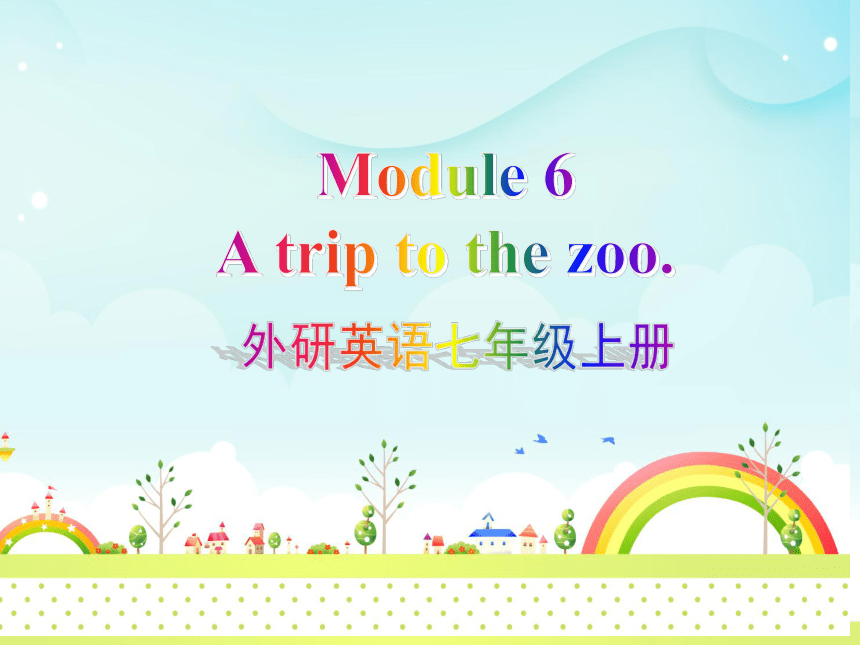
|
|
| 格式 | zip | ||
| 文件大小 | 1.2MB | ||
| 资源类型 | 教案 | ||
| 版本资源 | 外研版 | ||
| 科目 | 英语 | ||
| 更新时间 | 2017-09-18 00:00:00 | ||
图片预览


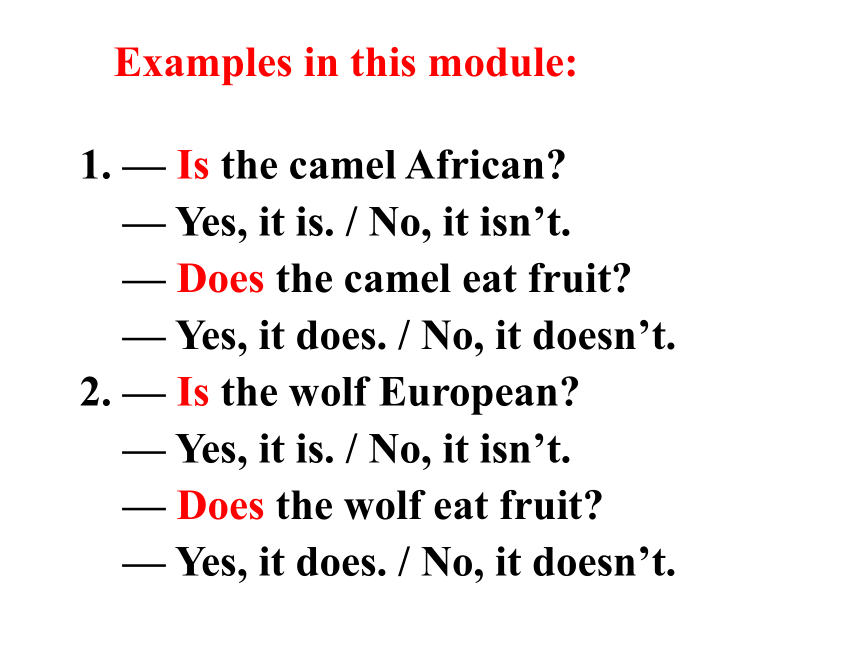
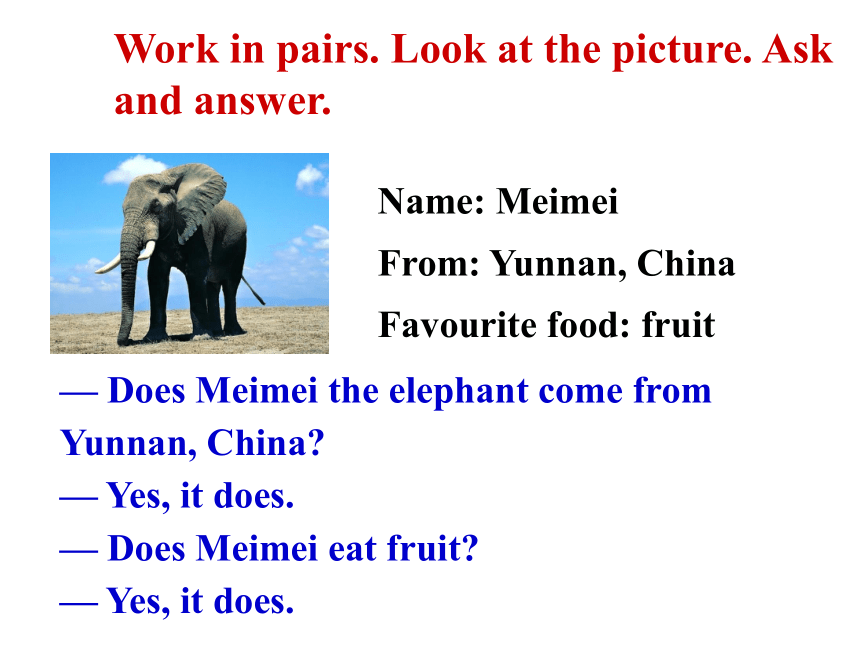
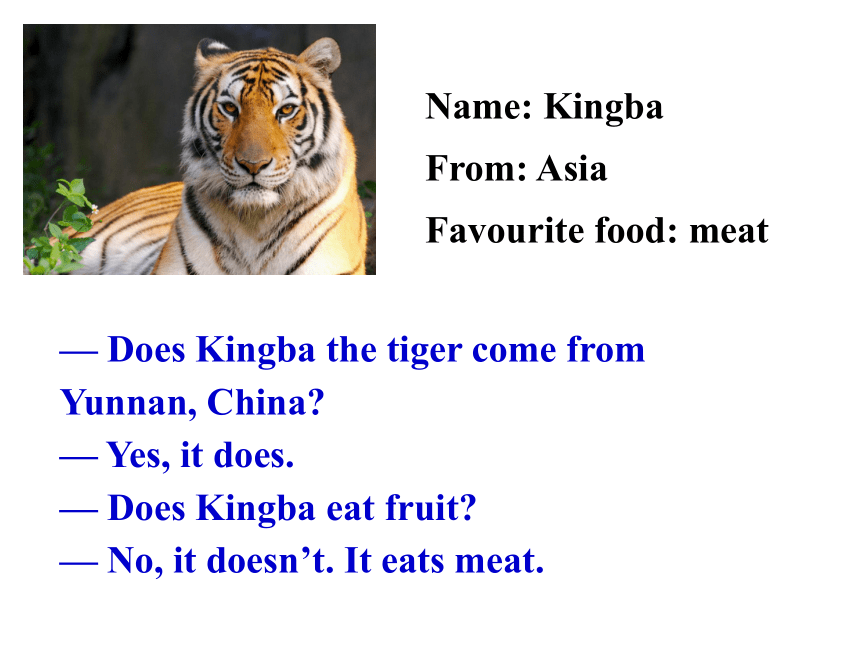
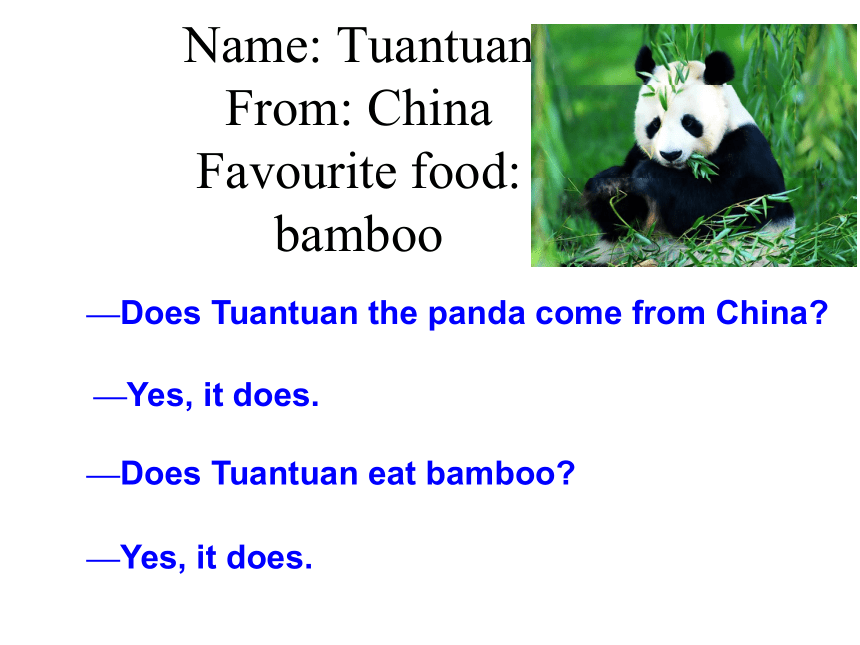
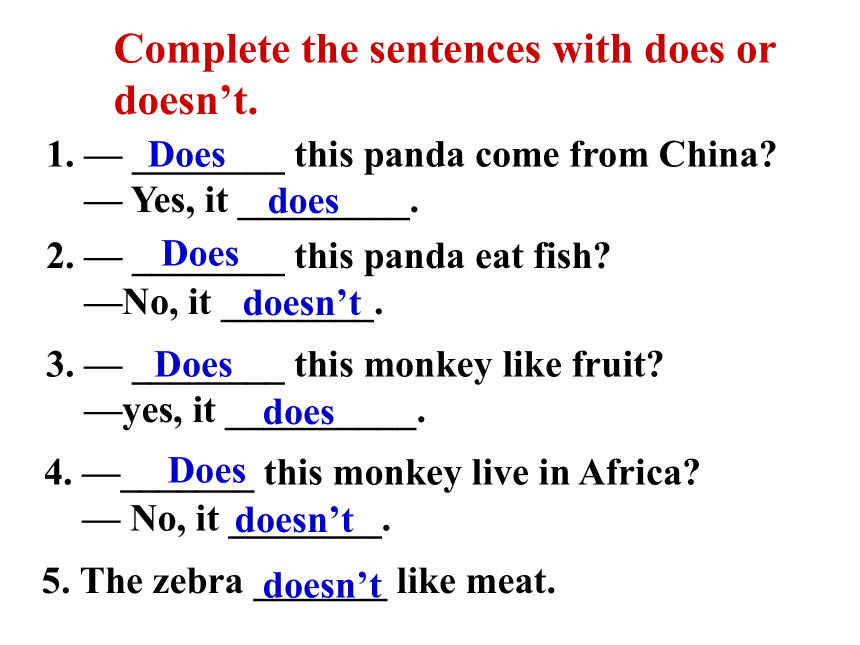
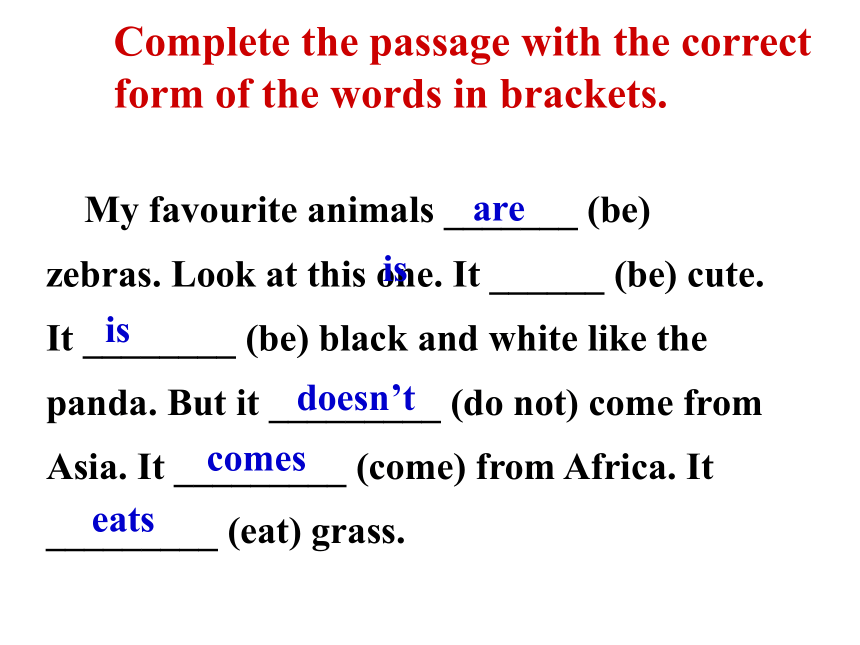
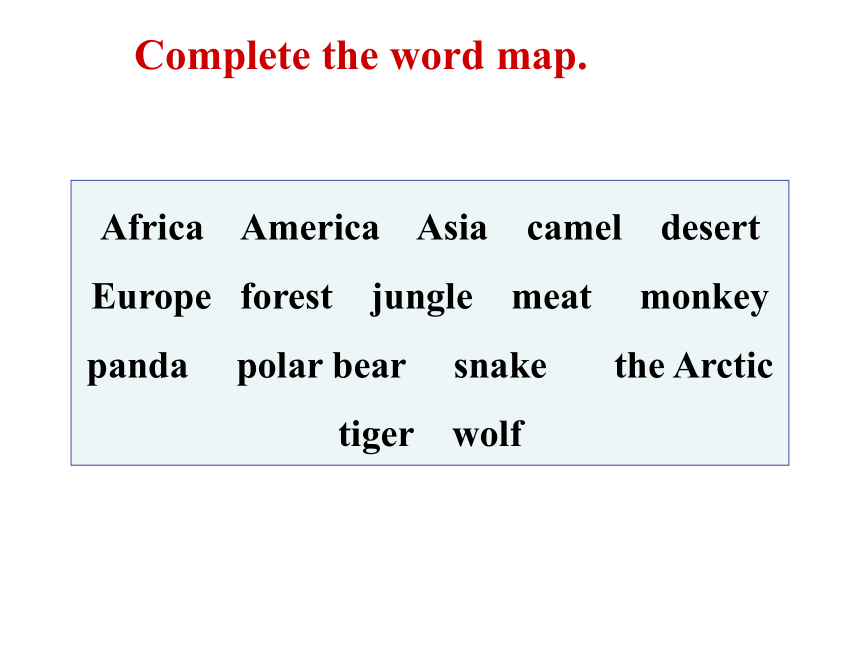
文档简介
课件22张PPT。外研英语七年级上册Module 6
A trip to the zoo.Unit 3
Language in useExamples in this module:1. — Is the camel African?
— Yes, it is. / No, it isn’t.
— Does the camel eat fruit?
— Yes, it does. / No, it doesn’t.
2. — Is the wolf European?
— Yes, it is. / No, it isn’t.
— Does the wolf eat fruit?
— Yes, it does. / No, it doesn’t.Work in pairs. Look at the picture. Ask and answer.Name: Meimei
From: Yunnan, China
Favourite food: fruit— Does Meimei the elephant come from Yunnan, China?
— Yes, it does.
— Does Meimei eat fruit?
— Yes, it does. Name: Kingba
From: Asia
Favourite food: meat— Does Kingba the tiger come from Yunnan, China?
— Yes, it does.
— Does Kingba eat fruit?
— No, it doesn’t. It eats meat.Name: Tuantuan From: China Favourite food: bamboo—Does Tuantuan the panda come from China?
—Does Tuantuan eat bamboo?—Yes, it does. —Yes, it does. Complete the sentences with does or doesn’t.1. — ________ this panda come from China?
— Yes, it _________.2. — ________ this panda eat fish?
—No, it ________.3. — ________ this monkey like fruit?
—yes, it __________.4. —_______ this monkey live in Africa?
— No, it ________.5. The zebra _______ like meat.DoesdoesDoesdoesn’tDoesdoesDoesdoesn’tdoesn’tComplete the passage with the correct form of the words in brackets. My favourite animals _______ (be) zebras. Look at this one. It ______ (be) cute. It ________ (be) black and white like the panda. But it _________ (do not) come from Asia. It _________ (come) from Africa. It _________ (eat) grass.areisisdoesn’tcomeseatsComplete the word map.Africa America Asia camel desert Europe forest jungle meat monkey panda polar bear snake the Arctic tiger wolfComplete the word map.tigermonkeymonkeyzebramonkeyelephantAfricapandaelephant当主语是第三人称单数,表示经常性、
习惯性的行为时,我们这样表达:
She speaks English.
He lives far away from school.如果表示不常做某事,该怎样表达呢?她不说英语。
She doesn’t speak English.
他住的离学校不远。
He doesn’t live far away from school.第三人称单数
作主语时的一般现在时你能总结出什么呢主语是第三人称单数时,行为动词的一般
现在时否定形式是在行为动词前加
doesn’t (does not ),这时要注意把谓语动
词还原为动词原形。试比较肯定与否定
句中行为动词形式的变化:
肯定:He gets up very early.
他起床很早。
否定:He doesn’t get up very early.
他起床不很早。如果要问别人是否经常做某事,我们要 采用下面的表达方式:
—Does the panda eat meat?熊猫吃肉吗?
—No, it doesn’t. 不,它不吃。
—Does it eat bamboo? 它吃竹子吗?
—Yes, it does. 是的,它吃。从以上例子可以看出,主语是第三
人称单数时,行为动词的一般现在时
问形式是在句首加助动词does ,而does
之后,后面的谓语动词像否定句一样也
要用原形。试比较:
肯定:He gets up very early.
他起床很早。
疑问:Does he get up very early?
他起床很早吗?肯定句:主语+动词的第三人称单数形式
否定句:主语+doesn’t +动词原形
疑问句:Does+主语+动词原形?
肯定回答:Yes, 主语+does.
否定回答:No, 主语+ doesn’t.现在把行为动词第三人称单数的各种
句式总结如下:Camels
The camel lives in the deserts of Africa and Asia and eats grass. Some people think it carries water in the humps on its back, but it’s not true. In fact, it’s fat.Where does the camel live?
What does the camel eat?
Does it carry water in the humps on its back?It lives in the desert of Africa and Asia.It eats grass.No, it doesn’t.Around the worldKangaroos
The kangaroo is an Australian animal. It eats grass and leaves, but it doesn’t eat meat. It carries its babies in a pocket on the front of its body. With its strong tail and back legs, the kangaroo jumps across the grassland.Where does the kangaroo live?
What does the kangaroo eat?
Does it carry water in a pocket on the front of its body?It lives in Australia.It eats grass and leaves.No, it doesn’t. it carries its baby.1. The monkey _____ (like) bananas.
2. Lucy ___________ (not visit) Japan.
3. ____ Tiger ____ (live) in the wild in
China?
4. The worker _____ (give) the lion ten
kilos of meat a day.
5. Where ____ the wolf _____ (come)
from?一、 用括号内所给动词的适当形式填空 likesdoesn’t visitDoes live gives does comeExercise1. My favourite animal is the elephant.
(对划线部分提问)
_____ _ your favourite animal?
2. Tony often goes to see his grandparents
on Saturdays.
(改为一般疑问句,并作否定回答)
____ Tony often __ to see his
grandparents on Saturdays?
No, he _______.二、 句型转换 What isDoes godoesn’t3. Our school has two thousand students.
(改为同义句)
_____ ___ two thousand students in
our school.
4. The panda is from China. (改为同义句)
The panda ______ _____ China.
5. The tiger eats 5 kilos of meat a day.
(对划线部分提问)
____ _____ meat does the tiger eat a day?There arecomes fromHow much1.Review the grammar we have learned today.
2.Make a poster of your favourite animals.HomeworkThank you.
A trip to the zoo.Unit 3
Language in useExamples in this module:1. — Is the camel African?
— Yes, it is. / No, it isn’t.
— Does the camel eat fruit?
— Yes, it does. / No, it doesn’t.
2. — Is the wolf European?
— Yes, it is. / No, it isn’t.
— Does the wolf eat fruit?
— Yes, it does. / No, it doesn’t.Work in pairs. Look at the picture. Ask and answer.Name: Meimei
From: Yunnan, China
Favourite food: fruit— Does Meimei the elephant come from Yunnan, China?
— Yes, it does.
— Does Meimei eat fruit?
— Yes, it does. Name: Kingba
From: Asia
Favourite food: meat— Does Kingba the tiger come from Yunnan, China?
— Yes, it does.
— Does Kingba eat fruit?
— No, it doesn’t. It eats meat.Name: Tuantuan From: China Favourite food: bamboo—Does Tuantuan the panda come from China?
—Does Tuantuan eat bamboo?—Yes, it does. —Yes, it does. Complete the sentences with does or doesn’t.1. — ________ this panda come from China?
— Yes, it _________.2. — ________ this panda eat fish?
—No, it ________.3. — ________ this monkey like fruit?
—yes, it __________.4. —_______ this monkey live in Africa?
— No, it ________.5. The zebra _______ like meat.DoesdoesDoesdoesn’tDoesdoesDoesdoesn’tdoesn’tComplete the passage with the correct form of the words in brackets. My favourite animals _______ (be) zebras. Look at this one. It ______ (be) cute. It ________ (be) black and white like the panda. But it _________ (do not) come from Asia. It _________ (come) from Africa. It _________ (eat) grass.areisisdoesn’tcomeseatsComplete the word map.Africa America Asia camel desert Europe forest jungle meat monkey panda polar bear snake the Arctic tiger wolfComplete the word map.tigermonkeymonkeyzebramonkeyelephantAfricapandaelephant当主语是第三人称单数,表示经常性、
习惯性的行为时,我们这样表达:
She speaks English.
He lives far away from school.如果表示不常做某事,该怎样表达呢?她不说英语。
She doesn’t speak English.
他住的离学校不远。
He doesn’t live far away from school.第三人称单数
作主语时的一般现在时你能总结出什么呢主语是第三人称单数时,行为动词的一般
现在时否定形式是在行为动词前加
doesn’t (does not ),这时要注意把谓语动
词还原为动词原形。试比较肯定与否定
句中行为动词形式的变化:
肯定:He gets up very early.
他起床很早。
否定:He doesn’t get up very early.
他起床不很早。如果要问别人是否经常做某事,我们要 采用下面的表达方式:
—Does the panda eat meat?熊猫吃肉吗?
—No, it doesn’t. 不,它不吃。
—Does it eat bamboo? 它吃竹子吗?
—Yes, it does. 是的,它吃。从以上例子可以看出,主语是第三
人称单数时,行为动词的一般现在时
问形式是在句首加助动词does ,而does
之后,后面的谓语动词像否定句一样也
要用原形。试比较:
肯定:He gets up very early.
他起床很早。
疑问:Does he get up very early?
他起床很早吗?肯定句:主语+动词的第三人称单数形式
否定句:主语+doesn’t +动词原形
疑问句:Does+主语+动词原形?
肯定回答:Yes, 主语+does.
否定回答:No, 主语+ doesn’t.现在把行为动词第三人称单数的各种
句式总结如下:Camels
The camel lives in the deserts of Africa and Asia and eats grass. Some people think it carries water in the humps on its back, but it’s not true. In fact, it’s fat.Where does the camel live?
What does the camel eat?
Does it carry water in the humps on its back?It lives in the desert of Africa and Asia.It eats grass.No, it doesn’t.Around the worldKangaroos
The kangaroo is an Australian animal. It eats grass and leaves, but it doesn’t eat meat. It carries its babies in a pocket on the front of its body. With its strong tail and back legs, the kangaroo jumps across the grassland.Where does the kangaroo live?
What does the kangaroo eat?
Does it carry water in a pocket on the front of its body?It lives in Australia.It eats grass and leaves.No, it doesn’t. it carries its baby.1. The monkey _____ (like) bananas.
2. Lucy ___________ (not visit) Japan.
3. ____ Tiger ____ (live) in the wild in
China?
4. The worker _____ (give) the lion ten
kilos of meat a day.
5. Where ____ the wolf _____ (come)
from?一、 用括号内所给动词的适当形式填空 likesdoesn’t visitDoes live gives does comeExercise1. My favourite animal is the elephant.
(对划线部分提问)
_____ _ your favourite animal?
2. Tony often goes to see his grandparents
on Saturdays.
(改为一般疑问句,并作否定回答)
____ Tony often __ to see his
grandparents on Saturdays?
No, he _______.二、 句型转换 What isDoes godoesn’t3. Our school has two thousand students.
(改为同义句)
_____ ___ two thousand students in
our school.
4. The panda is from China. (改为同义句)
The panda ______ _____ China.
5. The tiger eats 5 kilos of meat a day.
(对划线部分提问)
____ _____ meat does the tiger eat a day?There arecomes fromHow much1.Review the grammar we have learned today.
2.Make a poster of your favourite animals.HomeworkThank you.
同课章节目录
- Starte
- Module 1 My teacher and my friends
- Module 2 My English lesson
- Module 3 My English book
- Module 4 My everyday life
- Module 1 My classmates
- Unit 1 Nice to meet you.
- Unit 2 I'm Wang Lingling and I'm thirteen years ol
- Unit 3 Language in use.
- Module 2 My family
- Unit 1 Is this your mum?
- Unit 2 These are my parents.
- Unit 3 Language in use.
- Module 3 My school
- Unit 1 There are thirty students in my class.
- Unit 2 The library is on the left of the playgroun
- Unit 3 Language in use.
- Module 4 Healthy food
- Unit 1 We've got lots of apples.
- Unit 2 Is your food and drink healthy?
- Unit 3 Language in use.
- Module 5 My school day
- Unit 1 I love history.
- Unit 2 We start work at nine o'clock.
- Unit 3 Language in use.
- Revision module A
- Module 6 A trip to the zoo
- Unit 1 Does it eat meat?
- Unit 2 The tiger lives in Asia.
- Unit 3 Language in use.
- Module 7 Computers
- Unit 1 How do I write my homework on the computer?
- Unit 2 When do you use a computer?
- Unit 3 Language in use.
- Module 8 Choosing presents
- Unit 1 I always like birthday parties.
- Unit 2 She often goes to concerts.
- Unit 3 Language in use.
- Module 9 People and places
- Unit 1 We're enjoying the school trip a lot.
- Unit 2 They're waiting for buses or trains.
- Unit 3 Language in use.
- Module 10 Spring Festival
- Unit 1 Are you getting ready for Spring Festival?
- Unit 2 My mother's cleaning our houses and sweepin
- Unit 3 Language in use.
- Revision module B
